Mary Fleming's Blog, page 10
April 18, 2020
Confinement, Part III
 Life under a Super Moon
Life under a Super MoonFriday, 17 April
When we still had our Berlin life, I wrote about my husband David’s sixth sense, his inner GPS. At the time I believed this gift was limited to his ability to home in on a good restaurant or a charming village even in the most inauspicious surroundings. I now know his extrasensory powers extend to the natural world.
Soon after we arrived in this house one year ago (Easter Sunday marked our first anniversary), swallows began arriving at their summer residence, ie, the ground floor of our barn. By August, having installed David's office and our bedroom upstairs, we were sharing the building with about 30 birds.
Unfortunately for the swallows, our renovation project (if we ever get un-confined and the works actually start) includes turning their capacious aviary into a sitting room and our new bedroom. What the birds would do when they returned this year to find their front door boarded up has been a subject of much concern and discussion.
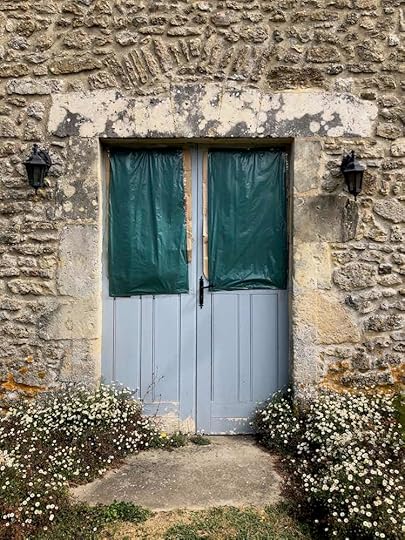
We had been dithering over various options—including building a special structure—until one morning two weeks ago when David sprung into action, deciding that a stall and attic space should be adapted to their needs.
While I fretted about how the swallows would react to our suggestion that they downsize from a château to a shack, he blocked the bottom of the stable door to prevent other animals from entering. He cut away the rosebush and vines that had grown over the attic door and opened it up, tied it to the wall. To help their nest-building he made some mud nearby and put out a bucket of water. Fortunately there was already straw in the stable.
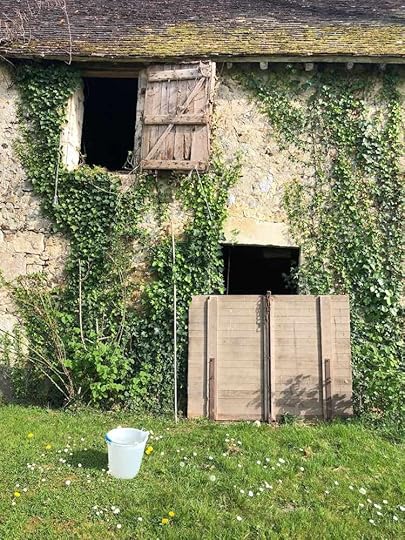
Cosmically, that very afternoon the first pair of swallows arrived. They are obviously practical, adaptable creatures because after several attempts (one successful) to enter their former palace, they accepted their fate and busily began work on their new quarters.
 Swallow calling friends
Swallow calling friendsThere are now about six of them swooping in and out and all about, perching on the electricity wires just above their new front door, singing their hearts out. They have become an integral, vivacious part of our confined family life down here at the end of the lane.
It was about this time that David looked at Tasha, lean and sinewy as a long-distance runner, and said: “We are never going to be able to bring that dog back to Paris.”
 The call of the wild
The call of the wildGranted this was more common than preternatural sense but I had to agree that her hunting expeditions were getting out of hand, that she was turning feral before our very eyes and something had to be done to rein her in.
Again several options were considered. We could keep her constantly on the lead but such extreme restraint for an animal with this energy level seemed close to cruelty. We tried a dog whistle and the ringer on her (real) GPS tracker but neither had any effect when she was in hot pursuit of a deer or a hare. So we opted for weighing her down with her Paris harness and the long plastic training lead I bought for her in Berlin. Thus equipped she sticks to the path, trots along with, rather than runs away from, us.
 The road home
The road homeWe have cramped her style but such is life. She now hunts lizards in the flower bed. As with the swallows, we hope she will adapt.
 I really do prefer deer
I really do prefer deerBecause Tasha is no longer running all over kingdom come and because we too are looking for exercise during these confining times, there are more walks. She and I continue our early morning thing. David now takes her for another 50 -minute therapy session at mid-day. I often go out again around 5. We follow the wild boar paths through the fields...
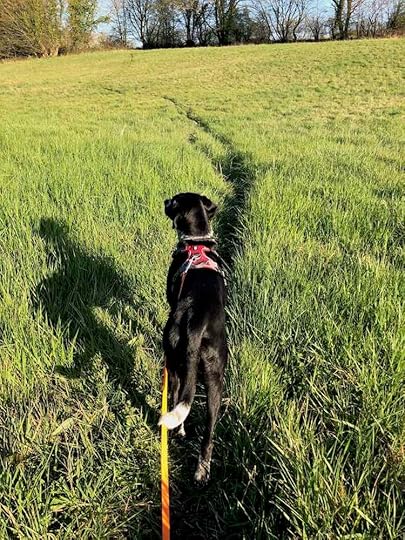
...into the magical woods above the house...
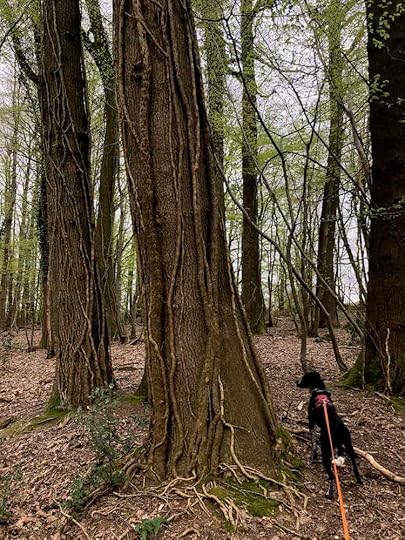
Sometimes the three of us walk together, exploring the vast swathes of countryside without encountering another soul. There have been some surprising discoveries, such as the crumpled remains of one of Tasha's three lost gilets jaunes.

Often we find old paths that through disuse now peter out, leaving us to clamber over or crawl under fallen trees and branches. We've started carrying secateurs so that we can cut our way through the rampant brambles. On several occasions we have followed Tasha's lead and slithered under a barbed wire fence.
Last week President Macron spoke again to the French public and announced May 11th as the new date for our possible release from lockdown. That will make a full two months of confinement. By then, three weeks from now, the question may be: Are we going to be able to bring David and Mary back to Paris? Everyone's adapted all too well to life down here at the end of the lane.
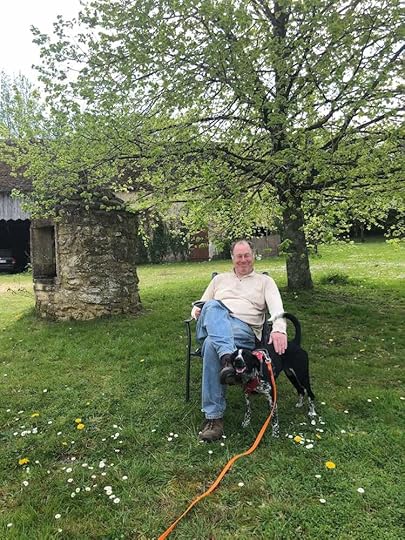
April 4, 2020
Confinement, Part II
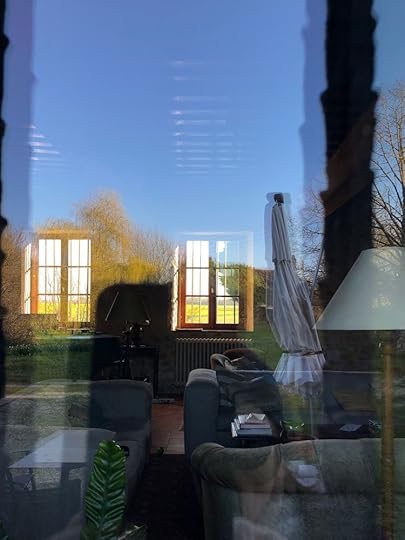
Friday, 3 April
“More bubble baths,” I said last December, adding to the list of my resolutions for 2020. I had just walked out of a Neal’s Yard shop in London, where I was stocking up on their heavenly Seaweed & Arnica Foaming Bath ("A restorative bath to enjoy when OVERTIRED"). It was a more serious prong to my strategy for a calmer life in the new year than you might think. It gave my son Christopher a good laugh.
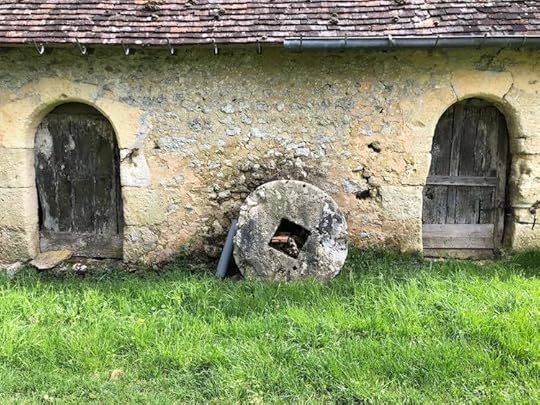
Here we are 17 days into our coronavirus confinement and a calmer life, even God could not design. Out here at our house in the Perche, the days slosh together in a sea of tranquillity. The only thing on the calendar is my Skype piano lesson on Tuesday afternoon and the writing of this blog. I think no further ahead than tomorrow and whether or not we need more bananas.
We might well have been living like this for a month…or maybe only 10 days, it’s impossible to judge the passage of time, but I certainly barely noticed the lost hour when our clocks sprung forward last weekend. The idea that at this very moment I should be in London, my book party having taken place last night, the Steve McQueen exhibit at the Tate Modern to be attended this afternoon and Tom Stoppard’s Leopoldstadt on the cards for this evening, is almost scary, it seems so frantic. So stressful.
Of course I am lucky. Solitude and a slow pace suit both my nature and my profession. Here in the country, there is an unseemly amount of space for two humans and one dog.
I would have thought just about everyone else would be going crazy at being cooped up in small spaces, reduced to jumping up and down in front of exercise and yoga videos in their living rooms.
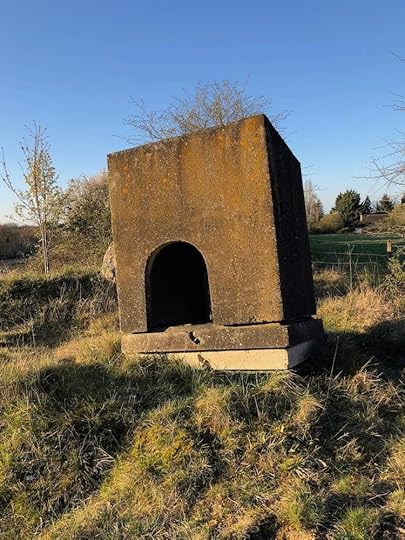
Especially since the confinement rules here in France have become even stricter. Outdoor exercise is now limited to within 500m of the house, leaving my friend Tala who lives near les Invalides to run round and round the grass plots on the avenue de Breteuil like a hamster. My friend Louise who lives at Montmartre runs up and down the stairs to the Sacré Coeur. It's farther than 500m from home but: "The police can't catch up with me," she says, "I'm so fleet of foot." Fines have gone up from 135 to 200 euros. A new form requires time of departure and place of birth (I have yet to hear a convincing rationale behind the latter bureaucratic flourish).
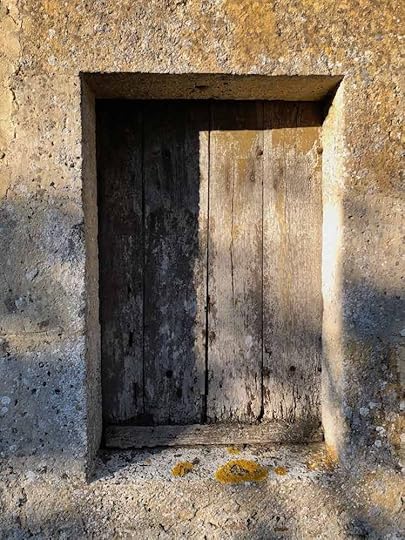
So I have been surprised by the number of people, all ages and types (none of them, it must be noted, with children at home), who have felt a relief similar to mine. A sample:
“Part of me,” my banker son-in-law Amal wrote, “is enjoying the fact that the world has stopped. It was all getting a bit breathless and manic.”
“The pressure’s off,” barrister Christopher said. “No need to have an opinion on the latest exhibition, to be busily bringing together interesting people at a dinner party.”
My former lawyer friend Michele put it another way: “No guilt,” she said. “It’s fine to do nothing! Finally!”
Locked in with nothing to do, yet how quickly it’s nearing 7 and time to hurry up, get supper ready, consider what we might watch on Netflix this evening. Where on earth has the day gone? As I said in my last posting, confinement does not fundamentally change my routine. I have stuck to it but with no fillers—coffee with a friend, meetings for the renovation of this house or one of the those exhibitions about which I must then form an opinion—you’d think my kitchen would be immaculate, my cupboards impressing even Marie Kondo. You’d think my novel was on its final commas, my Schubert Impromptu ready for public performance and my bathtub full of suds. Other than one soak in Seaweed & Arnica, none of the above has been achieved.
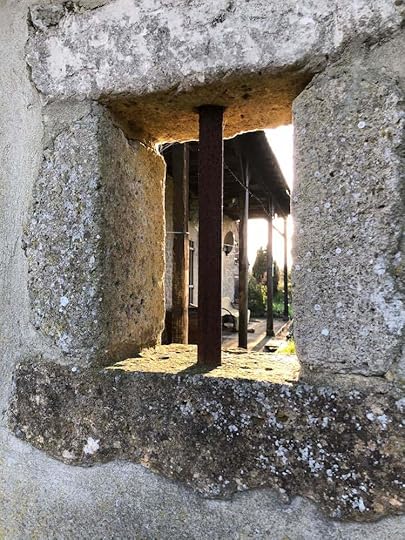
It’s partly a school’s-out feeling of laisser-aller, the theory (if it exists) that when we have more time, we're likely to waste much of it. Or use it in ways not seen as productive, such as manically communicating with friends and family via email, WhatsApp and even the humble telephone. Or watching funny videos. Or disappearing into a vortex of articles about the virus that has us locked down.
I've been distracted by nature as well. She, regardless of our stasis, is on the move. The birds are making their nests and the deer doing their mating dance. The rapeseed is flowering (a month too early)...
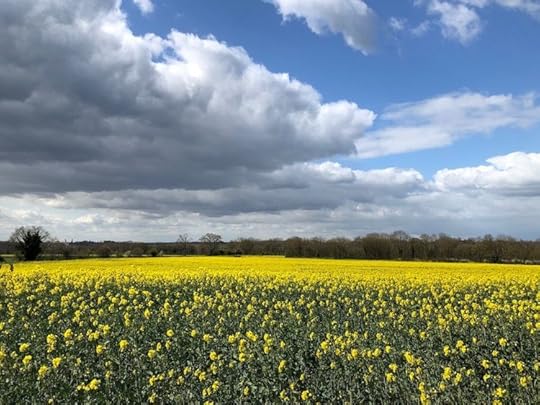
...and the first tender leaves are unfolding.
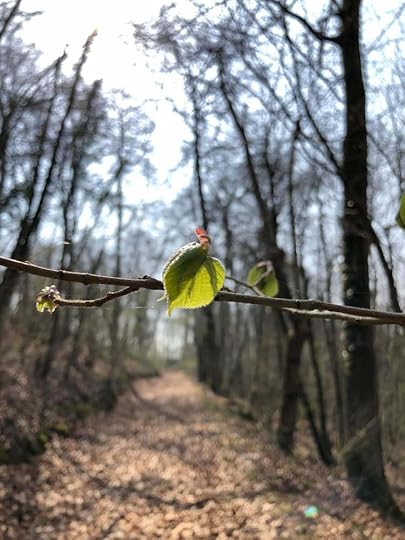
The wild flowers are carpeting the ground.
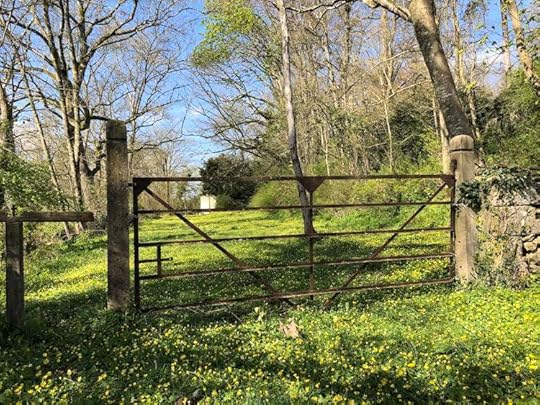
The planet, too, is rejoicing. The waters in Venice are clear and pollution in France is estimated to be down by 30%.
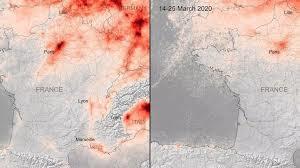 then and now
then and nowBut there's another reason my concentration and focus are not in peak form. Behind this simple living and the marvels of nature thrums Angst. There is, after all, a pandemic out there. The death toll grimly rises as the virus continues its invisible march. Economic fallout for those not retired or able to work at home is already catastrophic: 4 million French workers and 6.6 Americans applied for unemployment benefits just last week and that's obviously only the very tip of the melting iceberg.
When I do venture out to forage for food, I may not be dressed for combat...
 "I'm going to buy some bread. I'll be back."
"I'm going to buy some bread. I'll be back."...but that's only because all the products fortifying this man are sold out at the shops. The fear that one of those viral suckers will get in my mouth, nose or eyes and make its way to my lungs accompanies every outing. Just because my family and friends have largely been spared today doesn't mean they will be tomorrow.
Though I haven't felt it here in the Perche, there is understandable anger at people like me who are lucky enough to have a second house to escape to. According to an article in Le Monde, 17% of us Parisiens have left the city for their résidences secondaires and are being viewed with resentment by those left behind and as a disease-carrying scourge by much of the rest of the country. My friend Alan sent me an article about the residents of the Île-de-Noirmoutier trying to erect a barrier on the bridge to keep the interlopers out. Too little, too late. The Parisiens, like the virus, got through, thus contributing to increased chances for contagion and feeding local anger, especially when the city folk started swarming the beaches as if on holiday.
Pollution may be down in France but it's back up in China. For three days here in the Perche there was a ferocious wind, one in a long line of them these past months, that have knocked down or riven many trees. It so whipped and howled around our house that it was difficult not to anthropomorphize the message.
 Dying apple branch, continuing to blossom
Dying apple branch, continuing to blossomAfter unceasing rain this mild winter, the relentless sun and wind in March have left the earth like this.
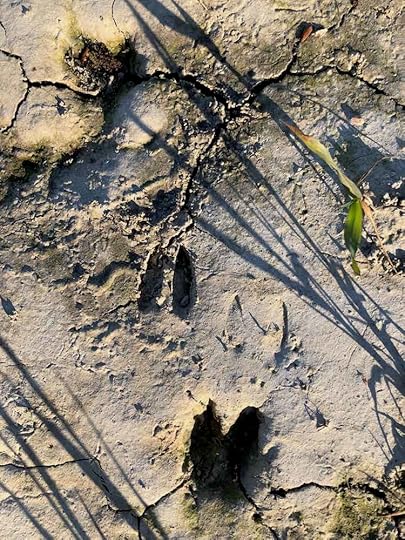
And underneath the glorious yellow flowers of the rapeseed field you see above are leaves covered by the pesticide glysophate. I try to keep Tasha out but when I don't succeed...
 powder blue poison
powder blue poisonYou read lots of messages of hope about a post-COVID-19 world, about all of us leading a simpler, more contemplative life, less focused on money and achievement. About a healthier planet. While I would sincerely like to put faith in that optimism, the pandemic is wreaking too much havoc for me to turn believer. I certainly cannot see myself wishing for more bubble baths next year, even in jest.
March 21, 2020
On the Early Days of Confinement
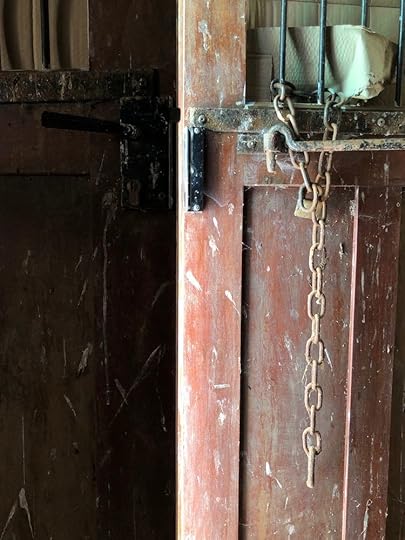
Friday, 20 March
Today it is hard to imagine that two weeks ago, when I last sat down to write this blog, my husband David had just flown to the US for a 10-day family visit. That he was planning to come back and immediately get on another plane to Georgia for 10 more days of board meetings and a conference on air pollution in Tbilisi. That I was still inviting people to an April 2nd book party in London.
Things started unravelling very fast, even while time simultaneously took on that slow motion quality of a dream. What seemed normal on day one looked implausible day two, impossible day three. The CEO of the health care company in Georgia on whose board David sits got the virus from someone who had just returned from Italy; the board meetings would be held via teleconferencing. Then the pollution symposium was cancelled. The fact that David had gone to the US at all started seeming near folly and whether or not he would get home before the world shut down became a huge source of angst. Last Thursday I woke up still thinking about the invitation list for the London book party. By late afternoon I was wondering...come Friday it was ridiculously obvious: time to call the whole thing off. It was just about then that the corrective text function on my iPhone started recognising ‘coronavirus’.
COVID-19 has burrowed its way into our lives with stunning speed and as explosively as the sea mine (with many more lethal nodules) it resembles. As much as I’d like to be writing about something else today, it’s all I can think about. It's all anyone is talking about.

David did get home, a day earlier than planned, and decided that since he had been on three long plane rides, he should self-isolate (this word, which I don't believe existed a month ago, has yet to work its way into my predictive text but it won't be long) for 14 days in the Perche. On Monday morning before we left, with the Tuileries closed, I walked the dog on the still half-flooded banks of the Seine...
 Jogger and map of the world
Jogger and map of the worldI went to help my friend Lara M get set up so she too could have her piano lessons via Skype in the uncertain future. On the route between us there are two pharmacies but I didn't get past the front door in search of the hand gel we are very short on.
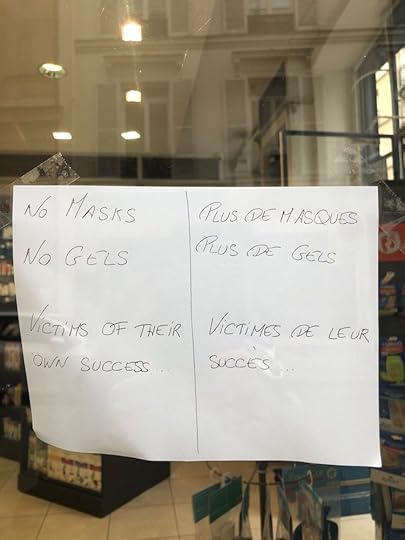
Monday evening, now in the Perche, we streamed President Macron's speech. There has been lots of criticism here about the way the government has handled the arrival of the coronavirus but compared to a couple of other countries which shall remain unnamed (finger pointing in a time of crisis should be restricted to a minimum like everything else), is France really that bad? Especially when you consider how battered the country has been these last 18 months. First the gilets jaunes, then the crippling transit strikes and now a pandemic.
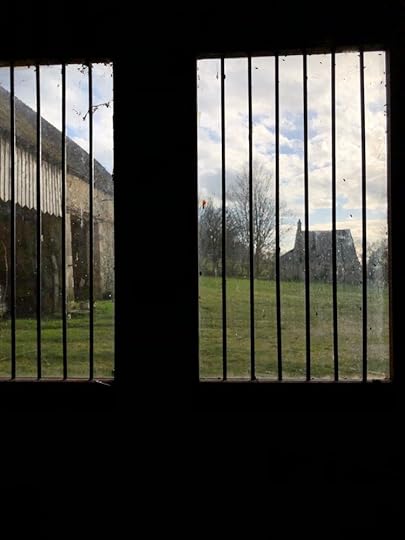
The speech proffered help for the millions of companies and their employees where all activity, and therefore the cash flow and ability to pay employees, has ceased. The new restrictive measures to be undertaken were clear: stay home, except for food shopping, a job that cannot be done at home, medical assistance or exercise for yourself or your dog. Every time you do go out, fill out this form or get fined 135 euros…
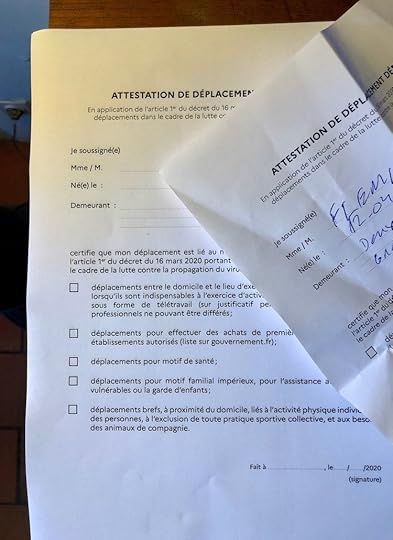
The next morning I and every other tax payer received a text message reminding us of restrictions and providing a government site where practical information could be obtained.

Four days into confinement, I feel sheepishly fortunate down here at the end of the lane where we are short on germs, long on space. No need to fill out a form when Tasha and I take our daily constitutional - we don’t encounter another soul. In a way my days haven't much changed. I write, play the piano, exercise, read. When we need food, I drive into the town of Bellême, same as always, except I'm holding my form in my gloved hand and keeping my distance from the other few souls on the same mission. The shops have helped by sticking tape lines 1.5 metres apart on the floor. Back home I wash my hands, get out the bleach.
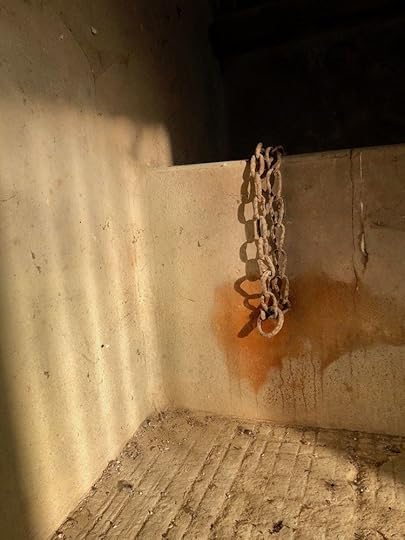
I do spend much more time than usual communicating. The need to connect with family and friends has never been stronger and I have been very touched by the number of people who have called or written to see how we are.
In every crisis someone benefits. At the top of the list, perhaps even ahead of gel, mask and glove makers, are the loo paper companies. Nations may have their different approaches to disease control but apparently one borderless human reaction is to buy a lifetime supply of the stuff. I have heard stories of people almost coming to fisticuffs over the last package on the shelf. This is not a fetish I share so I hope one day a study will be conducted on the phenomenon to enlighten me as to its primal causes.

Pets probably run a close second. They can’t get sick. They’re allowed to go out and their owners are home day and night. My friend Louise D sent me this photo:
 "Miss London is thrilled I am home all day.Here she is on my knees wrapped up in a cashmere (of course!) jumper."
"Miss London is thrilled I am home all day.Here she is on my knees wrapped up in a cashmere (of course!) jumper."Tasha, needless to say, is only too delighted for this open-ended stretch of time in the country.
 How does my kingdom smell this morning?
How does my kingdom smell this morning?Humorists are having a heyday as the above new payment scheme indicates. They do lighten up the day and help us laugh together.

Or...
 "3rd day of confinement: my wife is telling me to take a walk...she'll pay the fine."
"3rd day of confinement: my wife is telling me to take a walk...she'll pay the fine."Of course these are early days. It will undoubtedly get harder to laugh the longer our confinement lasts. There's a gallows backdrop to every joke. It is easy at moments to be gripped by fear that the invisible enemy will make its way into your own lungs, or to be seized by panic at the economic pandemonium that every day spreads faster than the virus.
Perhaps the best we can do in this scary, unknown territory is to keep communicating, maintain our mutual, albeit virtual, systems of support.

March 7, 2020
Greek Lessons

Friday, 6 March
Sometimes I ask myself what it is about Paris that I love so much. Near the top of a long list is the fact that so many of her buildings and monuments were here hundreds of years before I was born and, barring human folly, natural disaster or some combination of the two, will still be standing long after I am gone. The fact that I am just an infinitesimal dot in the vast tableau of the city’s history humbles but also comforts me. I am part of a continuum.
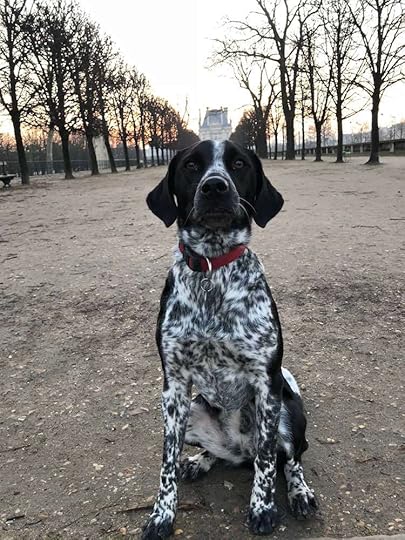
As anyone who reads this blog knows, I walk my dog—have walked my dogs (Lily, Elsa, now Tasha)—every morning in the Jardins des Tuileries, the oldest and perhaps the grandest gardens in France. Previously the site of a tile manufacturer (tuiles are tiles), the space was transformed in the 16th century by Catherine de Médicis, wife of King Henri II, to adorn the Palais des Tuileries that she was constructing for herself and future French royals. Over time the palace was replaced by the Louvre and the gardens have been re-landscaped, most notably by André Le Nôtre for Louis XIV in the mid-17th century. Not much has changed since then, including the public's right to flâner and relax amidst its trees and around its fountains.
 Le Nôtre's vision
Le Nôtre's visionFor at least as long as I have been walking dogs on the raised terraces (to the far right and left in the above picture), ie, since 1997, the gardens have hosted the Paris fashion shows. On the open space to the north side along the rue de Rivoli...
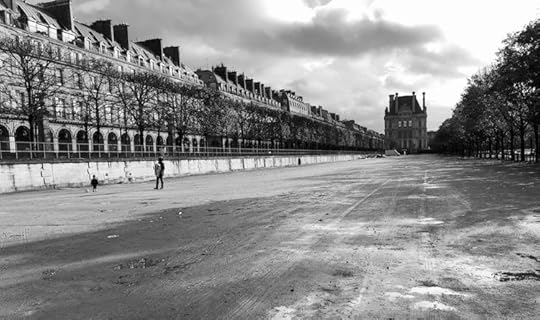
...tents go up...
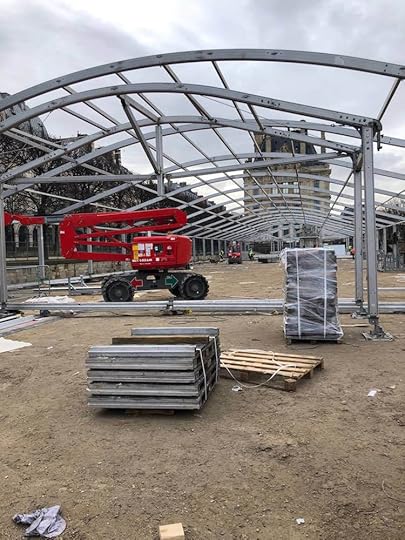
...and up...

Another large marquee is erected under the chestnuts on the south side...

Sometimes the building spills onto the place de la Concorde...

The process lasts some weeks, the time to assemble the structures, host the fashion shows and disassemble. It ruins the views, makes a lot of noise and generally disrupts a quiet morning walk but, as Stéphane, Nathaële and I say while the engines rumble and the hammers clang on metal, it creates jobs and with France's unemployment rate still hovering around 9%, how can you complain?
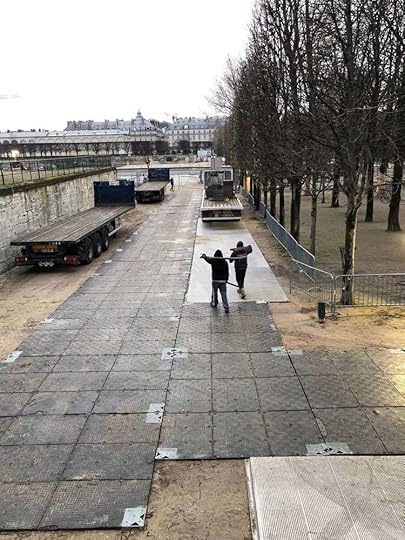
It seems to me, however, that these fashion shows have occurred with ever greater frequency over the last few years. That the gardens are constantly being disfigured by these white behemoths going up and coming down, that money is making the world go round with ever greater force. There's both haute couture and prêt-à-porter and there are I don't how many seasons in the fashion world's year. But it’s something I have mostly learned to live with.
Until now.
Early February I noticed that one of the fountains, the one you can see in the above drawing of the gardens from the 17th century, was cordoned off and drained. I saw nothing odd in this; even fountains need baths and I’ve seen them getting a good scrub before. But then a platform was placed on top of it. And the monster just kept growing…

…and growing…

…until it became this:
 The Dior fashion tent
The Dior fashion tentThe word ephemera, meaning what is transitory or trivial, comes from the Greek and originally denoted a plant or an insect with a lifespan of one day. That's about how long this tent got before dismantling began. As of this writing—a month or so after work started—all the building material is finally gone but the fountain remains covered in a black tarp and cordoned off so that the public must still make a large detour to get around its ugliness.
There’s something wrong with this picture on every level. Smothering the dignified and aged stone. Creating an eyesore for everyone on the outside so that those within can bear witness, for an hour or two, to this autumn’s vision of silky elegance. What a staggering effort for so fleeting a result. Not to mention the price tag. Jobs, yes, but at what cost?
There's another Greek word, hubris, and excessive pride, it seems to me, is exactly what is wrong with this picture.
Even now, sitting in the peace of my office, I am incensed. What is the matter with us humans? What can stop our insatiable natures?
Well, the Greeks had an answer to that too. When human pride spins out of control, in steps Nemesis, the goddess of retribution. And by all appearances she is descending to earth at this very moment. The coronavirus, on everyone’s lips metaphorically if not yet physically, has kept many away from this fashion week. A couple of shows were cancelled. Traffic in and out of the tents was eerily sparse.
Elsewhere in our frantic world other public gatherings, from book fairs to sports events to James Bond premieres, are being cancelled or postponed. Cruise ships, those horizontal Xanadu skyscrapers that criss-cross our planet and pollute our oceans, are proving to be petri dishes for the disease. Hundreds have fallen ill, requiring thousands of virus-exposed passengers to remain trapped in their cubicles for weeks.
A 'lethal plague' is the backdrop to the most famous Greek tragedy Oedipus Rex and Sophocles wrote the play during Athenian pestilence of the late 5th century BCE. It is where countless early teens, myself included, are taught the terms hubris and nemesis.
So what have we learned in the last 2500 years?
But let's not finish on the negative note of our incorrigible natures. The days are lengthening; the premature spring is in the air. And with luck the fountain will soon regain all her grace and glory.
 April in Paris
April in Paris
February 22, 2020
The Miracle Drug
 Creative sky
Creative skyFriday, 21 February
We are nearing the end of a week here in the Perche. The days have developed a gentle rhythm, starting at 6, if I am lucky enough to sleep that long. I waste no time getting dressed as our bedroom above the barn, with little heat and no insulation, is freezing. Equipped with my headlight these dark winter days, I descend through the mess the swallows left and over the gravel, into the warm house.
The one to two hour period between getting settled on my chaise longue and walking Tasha is of vital importance to my day. Enveloped in the silence of the still sleeping world, with my mind still fresh and clear, I sip my coffee and write. And if I miss this magical spell, the rest of the day is likely to be unproductive.
I have the same routine in Paris but there the morning walk looms as an interruption. In the city there’s always a certain level of aggression, however passive it may be at that hour. I usually meet my dog-walking friends in the park and though the social interaction is good for the often uncouth dog and pleasant for me, it is a distraction.
Here in the Perche, however, it’s just Tasha and me and this blessed countryside.
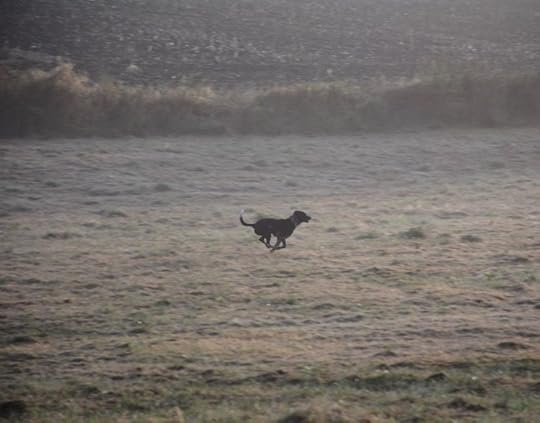
Studies have found that nature is very good for us humans: "Being in nature, or even viewing scenes of nature, reduces anger, fear, and stress and increases pleasant feelings. Exposure to nature not only makes you feel better emotionally, it contributes to your physical wellbeing, reducing blood pressure, heart rate, muscle tension, and the production of stress hormones. It may even reduce mortality." (from the University of Minnesota website)
But they don’t mention the effects of this miracle drug on mental acuity.
What I am finding is that the morning walk here in the Perche is an important extension to the morning’s work. The combination of oxygen to the brain and the exhilaration sparked by the surrounding natural beauty also sharpen my mind, meaning that while I walk many ideas bubble to the surface.
Originally for Tasha’s sake, I decided to follow the same route every day. It would be reassuring for our nervous dog, I thought, and if she got led into temptation by a deer or a hare, she would know where to find me.
The walk is a figure 8. We head down the lane...
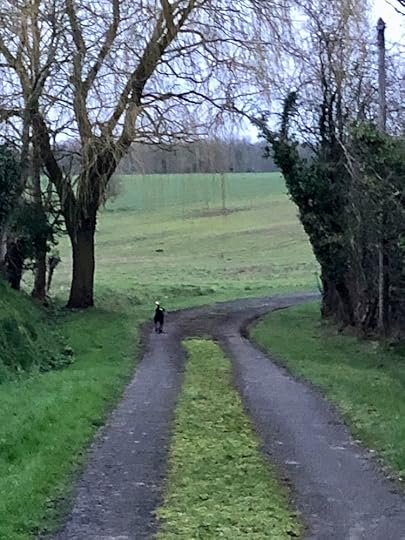
...past Jean-Michel’s salmon-pink barn to the left.
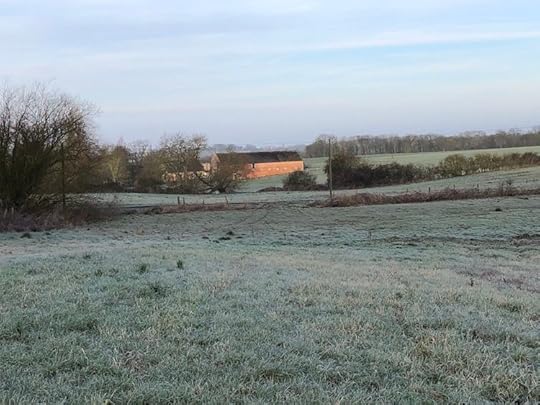
Tasha tears across the surrounding fields and in 10 minutes has had more exercise than she gets in a 90-minute stroll through the Tuilieries or along the Seine. We turn right through this bower...
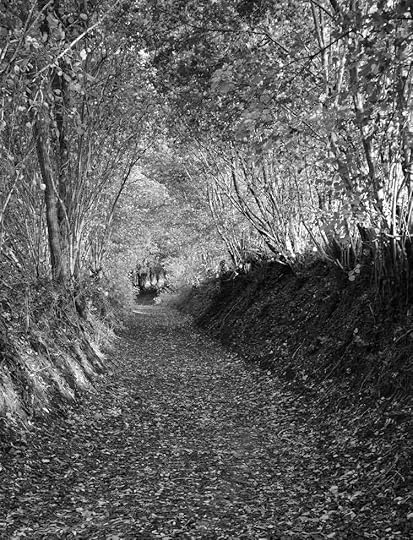
...which leads to - given the buckets of rain we've had this scarily mild winter - the muddiest footpath I have ever seen. At certain points I have actually had to pull myself out by the bootstraps. But I relish every schlurp and schlop because I remember last summer and the scorched earth that even had me feeling sorry for the drooping nettles.
Not long before reaching the village, its church tower rising above the rooftops...
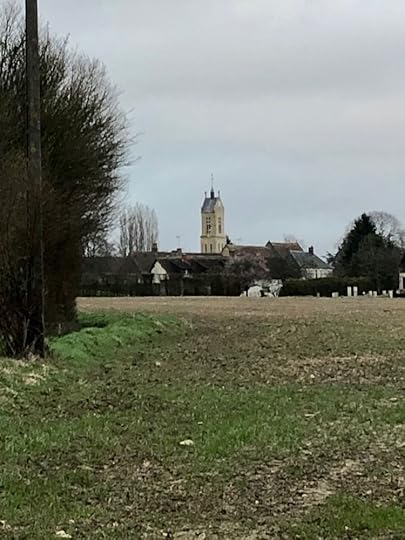
...we turn left, through paddocks where we are greeted by a horse and a goat…
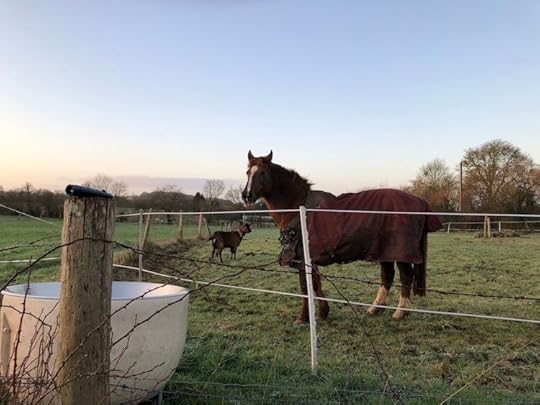
...and a pony...
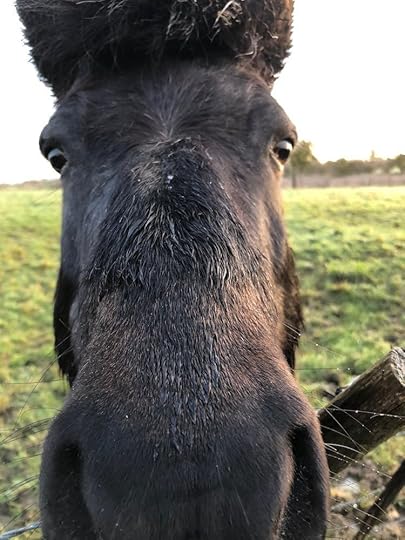
We loop back via Pascale’s house...
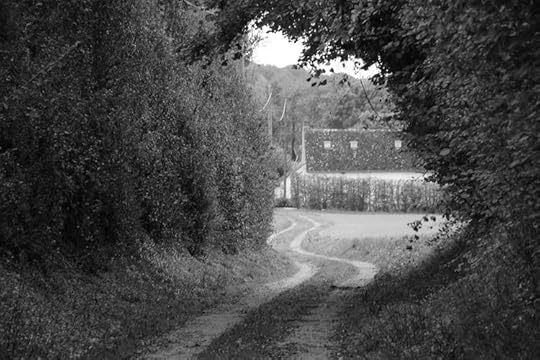
... onto the same path, until looping again around the back of our house through the fields. At a good pace it's about a 50-minute outing, far more salutary and much cheaper than the equivalent hour on a shrink's couch.
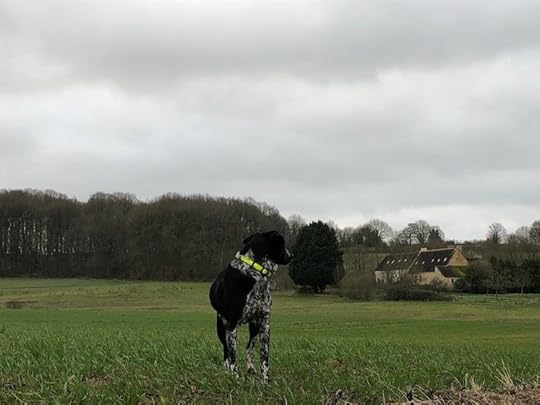
In the end I probably feel more reassured by this repetitive walk than the dog. There is comfort in knowing what is around the next corner. I now know the neighbours whose houses I pass. I like seeing my footprints from the day before in the mud. Trees become not just points of reference but in their way friends, with different moods.
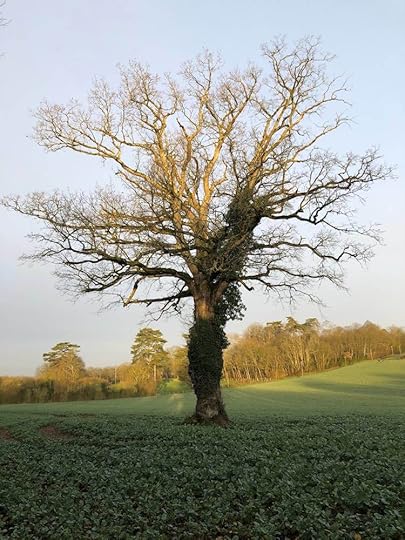
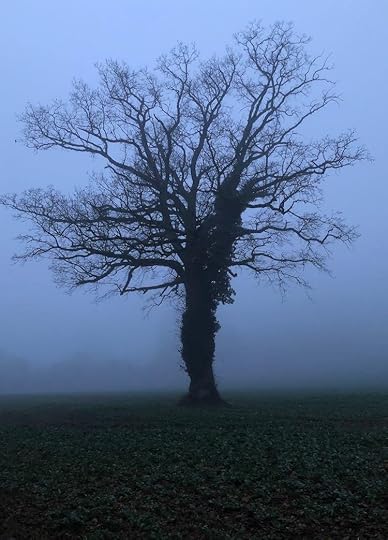
Of course you can only know the path ahead up to a point. Nature is not static and the surprises are generally as cheering as the sameness. As the photos show, leaves come and go; the light is ever changing. In January I’d set off in the dark, Tasha’s gilet jaune glowing across a field and the sun only edging its way up half-way into the walk.
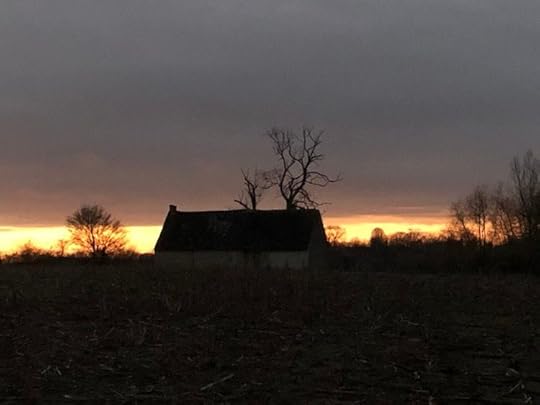
This week (and a third lost gilet jaune later) it's light enough for the deer to be out and the birds to be chirping. But still early enough for me to have witnessed, every morning, the commanding wingspan of a barn owl as it swoops over a field in search of a last nibble before bed.
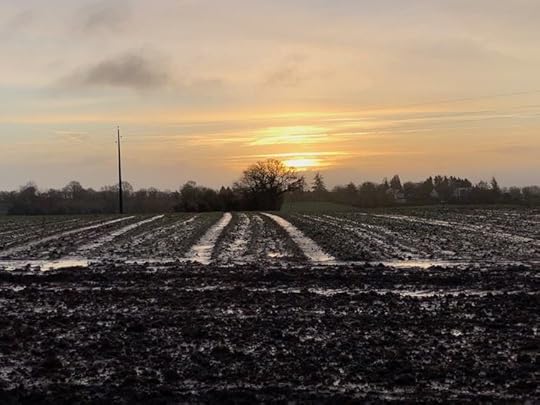
For the last few days I have had a worsening cold. Collecting my thoughts has been a challenge. This morning David came over from the bedroom at 7.30 and called up kindly: "Would you like me to take the dog this morning?"
"No!" I cried. "This blog needs a good walk!" Here you have it.
February 1, 2020
Lessons in Fear Management
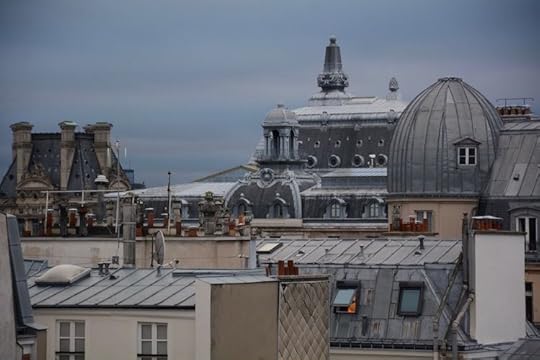
Friday, 31 January
Today is a sad day, not because the sodden weather has merged Paris rooftop and sky into one lump of grey or because it’s 10°C (20+°F) too warm for the end of January, but because come midnight the United Kingdom will forsake the European Union and retract into the confines of a small-island stand-alone state.
I ventured my opinion on the narrow decision to go solo in 2016 and haven't changed my mind one jot, like almost everyone else with strong feelings on the subject. Leavers have continued to see the lone road ahead like this…
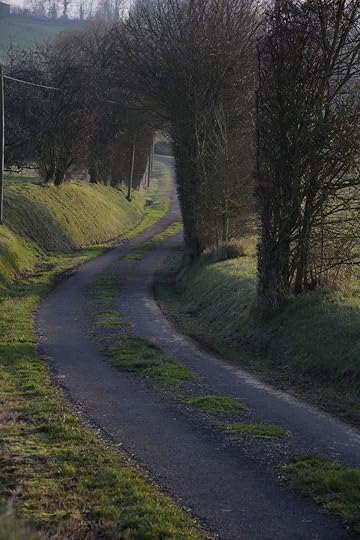
…and Remainers more like this…
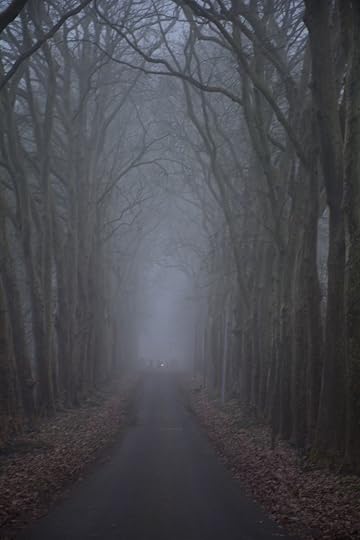
Whichever side you are on, it has been disheartening to watch a continued inability to compromise, despite the closeness of the referendum's results, and to witness the country turning itself into a laughing stock on the world stage. Parliamentary debates have often looked more like cock fights than the deliberations of a venerable legislative body. Absolutely nothing seemed to get done, except the rehashing of an agreement that no one could agree on. Not, anyway, until Trumpian Boris Johnson, who played a heavy, not quite even hand in the Leave Campaign, succeeded in his long-term plot to become prime minister. After all the convoluted wrangling, he won on the simple slogan "Get Brexit Done". Tomorrow twill indeed be done, leaving the multitude of details in the divorce settlement to be thrashed out over the next year.
Over here on the Continent, the final act of this tragicomedy has elicited shoulder-shrugging from some, relief from others. As recently retired French European Parliamentary deputy Alain Lamassoure put it: “The British have been constant pains in the ass since 1973.” For those of us like me, however, who hold a UK passport and want to continue living in the Union it has triggered angst and despondency.
I obtained nationality through my first husband Charles. In many ways it seemed a natural development in my life. My father was a Royal-loving Canadian. One of my first memories is in Toronto in his arms, waving a flag at a passing Queen Elizabeth whom I vexingly never actually managed to pick out of the crowd because she wasn't wearing a crown. My first school years were spent in a very British-style institution; along with O, Canada, we sang God Save the Queen every morning at chapel. All that Union Jack waving must have had some influence on my decision to study in England my junior year of college and perhaps laid the groundwork for those nine months that so profoundly changed my life. It was then that I fell in love with this side of the Atlantic.

Today I look across the Channel from Paris and feel let down, even resentful. Until tonight at midnight being British has been a source of pride because it has allowed me to be a European, which is what I profoundly feel. Now who am I? And what about my children and their partners, Georgina and Amal, Christopher and Kerry, who live and work in London? What will Brexit mean for them and the UK economy?
 Dawn, Jardins des Tuileries
Dawn, Jardins des TuileriesThis January also marks three years since I collected the quivering, crouching wreck that was Tasha from the animal shelter in Tilloy-les–Mofflaines. That’s a fair chunk in the life of a dog and, given her complications, a toll-taking slice out of her owners’ as well. It's been a while since I've given you an update. How is she doing?
Still a princess. I don't know where this Franco-German dog got such a taste for royal ways but she requires comfortable bedding wherever she settles.
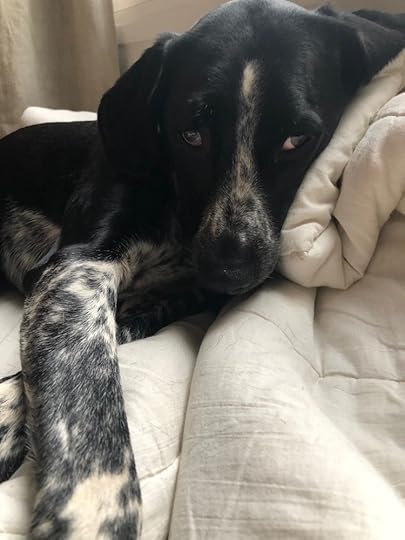
When we come in from a rainy walk, she sits pertly at my feet waiting for me to towel her dry. Her demands for affection are ever more imperious and if not satisfied are now accompanied by barking.
 Love me, now
Love me, nowShe is very sporty...
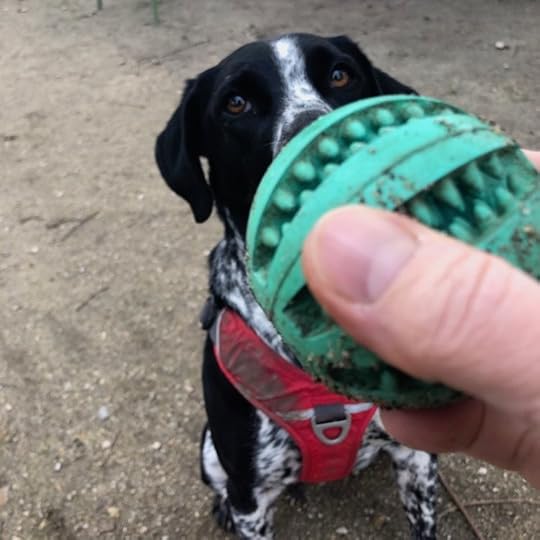
...and loves to roam the countryside, while stoically accepting certain constraints to her freedom of movement...
 Hunting equipment: gilet jaune and GPS tracker
Hunting equipment: gilet jaune and GPS tracker Urban Outfitting: blinking red light to improve visibility on winter mornings
Urban Outfitting: blinking red light to improve visibility on winter morningsUnfortunately Tasha continues to have a somewhat fearful, recalcitrant relationship with the outside world, barking at certain human and canine strangers, particularly when tethered to her lead. But she does make an ever greater effort to control herself and as everyone remarks who has seen her at different stages over the past three years, she is much calmer. Last weekend, for example, we finally had a house-warming party in the Perche and after some initial protest, she settled right in and enjoyed herself as much as the numerous guests.
Ditto with Koffi, where Tasha still joins the pack once or twice a week for long walks in the Forêt de Meudon that go some way to tiring her out.
 A European Union
A European UnionCome to think of it, she shares many traits with the British: monarchical, sporty, outdoorsy, somewhat xenophobic. But if a dog like Tasha has managed to tame her baser fear instincts and realize the benefits of communal living, what on earth is wrong with the British people?
January 11, 2020
Inward and Onward
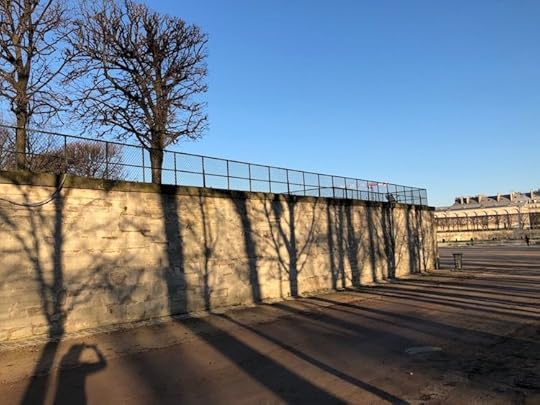
Friday, 10 January
Think back, look forward. That is what January is for, especially one marking the beginning of a new decade. How do my musings from a year ago, for example, appear now? What might these 2020s hold?
 Out with a bang: sunrise 31 December 2019, le Perche
Out with a bang: sunrise 31 December 2019, le PercheUnfortunately the larger world is looking frighteningly the same or worse. If last January I was close to giving up, hope continues to take a beating. I actually wonder how much those four little letters can withstand. The planet is still being abused by us insatiable humans and no one—except a young Swede—is doing anything meaningful to restrain us; America and Iran may be on the brink of war; Britain’s about to go solo; populism and authoritarianism continue their not so slow march; opinions on everything from embryos to migrants to gender, from the meaning of truth itself, are more polarised than ever. In fact it’s as if a socio-cultural iron curtain were coming down between the two sides, leaving the centre a wasteland.
 U-Bahn Station, Berlin
U-Bahn Station, BerlinCloser to home, here in France and on the streets of Paris, it almost defies belief that last January we were being held hostage by les gilets jaunes and this January by strikers of all stripes: transport workers, teachers, hospital workers, even lawyers.
 One tired gilet jaune
One tired gilet jauneBecause there are some trains and some buses, along with bicycles and scooters and Ubers, conditions are not as bad as they were during similarly crippling strikes in 1995, but this bout of discontent, also against pension reform, has already gone on significantly longer, with no end in sight. Meetings are cancelled, events postponed and offices close early or don’t answer the phone. And in the streets the atmosphere sours as people tire of jostling their way during endlessly long commutes to and from work. On the news I heard a nurse, squeezed like a juice orange into one of the few available trains, say: “I don’t know what I think about the strike, except that I hope I’m still alive at the end of it.”
The inability to live normally wears on morale but also on the civic fabric. Parisiens, never the most civilly-minded of citizens, have taken the strike as licence to do pretty much anything they like, from running red lights to riding bikes at high speed through thick crowds of pedestrians.
If the outer world seems stuck, it has, paradoxically, been a year of much movement on the personal front. David and I left our Berlin life and bought a house in the Perche. Once again (both the up and down side of writing a blog is there’s a record of what you did and what you thought about it) I travelled too much. There were trips for family and friends and for my novel The Art of Regret* that was published in late October.
 Plane breakfast
Plane breakfastSo what about the way forward in this new decade? The global outlook is not promising. I and many of my friends will continue to recycle, to use less plastic. We'll buy more eco-products and fewer new clothes and it will make absolutely no tangible difference to the planet, especially since most of us will continue to travel by air.
 Chez Christopher and Kerry, London
Chez Christopher and Kerry, LondonI'll still feel inconvenienced by the permanently disgruntled French but will keep riding my bicycle around them and being grateful I'm not a shop owner on a three-hour commute to a business that is flagging because who wants to shop during a strike.
It's only on the personal front that effective action feels possible. During the last decade, much of it spent going back and forth between Paris and Berlin, I have too often felt like Sisyphus pushing a boulder up the hill. I'd make some progress on a novel or a piano piece, then we'd change cities and the disruption would cause the boulder to roll right back down again. Though my blog entries remind me of several attempts to defy this pattern, I never really broke it. I have yet to finish, for example, the novel I started in 2012. My piano repertoire has stagnated like an old pond.
So I am determined 2020 will be different. I have no travel plans beyond a short trip to London for a book party and a visit with my children early April. I'm already back to work on that novel and have started learning one of my favourite Schubert Impromptus (n° 3 in B-flat major). It's time to look inward, in order to move onward.
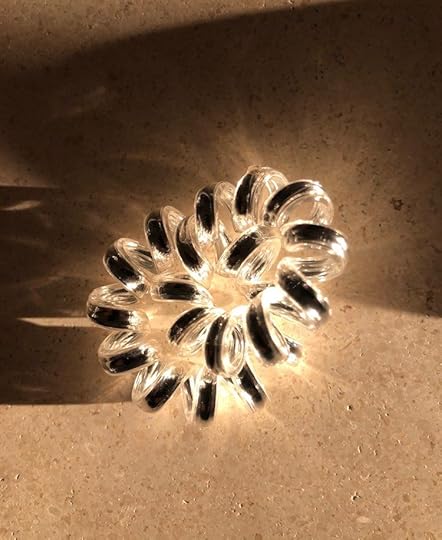
________________
*Yesterday I made my first television appearance, when France 24 English interviewed me about my book.
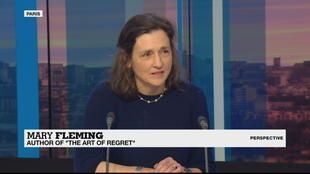 Click here to see half (7min34sec) of my Andy Warhol 15 minutes of fame
Click here to see half (7min34sec) of my Andy Warhol 15 minutes of fame
December 14, 2019
Plus ça change

Friday, 13 December
Some words and expressions capture a concept so aptly they are untranslatable. Often that's because the meaning conveys a quality firmly grounded in the native culture. Gemütlich for example captures the homey cosiness that Germans need to get through winter, while plus ça change, used in English as well as French to denote history being doomed to repeat itself, is anchored in the Gallic soul.
This turn of phrase has never seemed so apposite here in Paris as right now. In December 1995 France was paralysed by national transit strikes and here we go again this December for exactly the same reason: the government has proposed reforms of the pension system and the public is furiously opposed. At the heart of the debate 24 years ago was the régimes spéciaux whereby French train drivers were allowed to retire at the tender age of 50; those drivers are on the front line again today.

By a mini-twist of fate, the first section of my recently published novel The Art of Regret is set during that 1995 protest movement and provides proof in black and white of this Groundhog Day moment in French life. The protagonist Trevor talks about the entire public sector being unhappy but: “The shrillest cries [came] from the train drivers, the ones who had gained the right to retire at fifty, in the days when driving a train was hard work, not merely a matter of pushing buttons. Technology had changed, but not the laws or the drivers’ expectations.”
In part the French just like a good strike more than your average European.
 From The Financial Times
From The Financial TimesBut the causes go deeper than a penchant for revolution. Both then and now what underpins the grievances of the public sector, including teachers and hospital workers, and what garners the support of the population at large is the great divide between the elites and rest of the country. As Trevor’s French step-father Edmond says during a heated discussion at a Sunday family lunch:
“’The point is…change in France always occurs through conflict…In many ways, nothing has changed since well before Louis the sixteenth lost his head. The titles have evolved, but the dynamic has remained the same: instead of a king, we have a regal president. Instead of a ruling aristocracy in the king’s court, we have bureaucrats, the highest achievers in the country, running the place. And meanwhile, the people form their own impenetrable factions.’”
Which translates into Paris once again looking like an anthill that has been poked with a large stick. All the people who are usually travelling underground have surfaced. Streets are blocked solid with cars or police vehicles...

or eerily emptied...
 Christmas lights on an empty place de la Concorde
Christmas lights on an empty place de la ConcordeThere is a sense that no matter the content of the prime minister Edouard Philippe's proposed reform to simplify and equalize the 42 existing pension schemes, the strikers will keep striking until the government caves in completely, à la 1995, or until public support plummets (which may yet happen if they carry out their threat to keep going through Christmas).
Despite the appearance of one strike duplicating another, there are of course dissimilarities. Even in the film Groundhog Day, where Bill Murray keeps waking to the same morning, what happens in the course of his day varies.

This one seems to me anyway less disruptive. Some trains and buses are running and today people have other forms of locomotion. In 1995 , for example, almost no one (yours truly being part of the 'almost') owned a bicycle. As such the strike actually proved a windfall to my protagonist, bicycle-shop owner Trevor: in those three weeks “the status of bicycles rose from the untouchable world of shabby hippies and the fractious proletariat to the heady heights of latest Paris chic.” The strikes launched a movement.

Certainly there were none of the electronic trottinettes (scooters) for people to glide around the city on, heedless of any pedestrians in their path. And the internet was only nascent; working remotely from home was years away. As I remember it in 1995, all activity ground to a halt. But here, last Tuesday, the scaffolding that has been blocking passage on the rue de Solférino for years, was finally being dismantled, even while a wave of protestors flowed by on their way to the National Assembly.
 Construction worker in gilet jaune standing back while demonstrators pass
Construction worker in gilet jaune standing back while demonstrators passOn the tail of the above protestors who had just walked through the Tuileries gardens were the bobos, obliviously exercising.
 Those who squat together stick together
Those who squat together stick togetherIf everyday life seems to be carrying on with less disruption than 24 years ago, these strikes are more troubling on a deeper level. The have/have-not divide is wider than ever. There are more homeless in the streets.
 "Savings Bank"
"Savings Bank"If the unions are much reduced and wield less power, France has already been battered for the last year by les gilets jaunes, a more amorphous but equally energetic movement of popular discontent.
Attitudes have changed. Though no one would have accused the 1995 prime minister Alain Juppé of modesty, his arrogance was of a different brand than what President Emmanuel Macron and his cohorts are denounced for. Our wine merchant, who has been sleeping night after night at the back of his shop and, like many small business people, actually supports the reforms themselves said to me: “They always seem to have a little smile at the corner of their lips, as if they find all this mildly amusing.”
People see a smug Rothschild banker in the president's mien and do not like the face of Anglo-Saxon style capitalism. “Of course the system has to change," a friend said to me. "But not like this. Not towards a society where nothing but money matters.”
The spectre of the extreme right wing National Front looms large. With the traditional parties currently moribund, the Rassemblement National as it is now known constitutes, de facto, the opposition. Behind people's frustration is a belief that it’s all leading to a victory for their intolerant, xenophobic vision in the 2022 presidential elections. It's expressed with a disturbing sense of fatality, perhaps even Schadenfreude vis-à-vis the current government.

An escape into fiction is not a bad idea. In The Art of Regret you'll get a glimpse of Paris both then and now. And while you're at it this holiday season, why not order copies for family and friends as well?
November 30, 2019
Touring
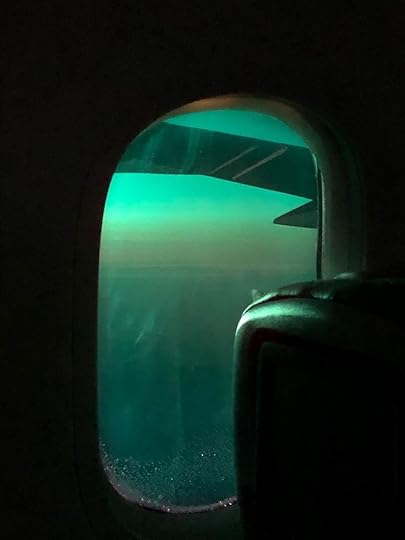
Friday, 29 November
They say that just before you die, your whole life passes before you. That has just happened to me but, as of this writing, I am still very much alive.
Though still recovering, from a 10-day whirlwind book tour of the US for my novel The Art of Regret. Fortunately not one of the nightmare scenarios I imagined in my last blog came true. Except for an error in reading a bus timetable that did not affect anything but the state of my nerves, travel went smoothly. Each event was well-enough attended and I didn’t embarrass myself by freezing up mid-sentence. Hearty thanks to all of you who came - and bought books!
My route was snail-shaped: San Francisco, Boston, Wayne, PA, Philadelphia, Washington, Chicago. And thanks to the long arms of social media and email, people from my past - the way long ago past of my elementary school in Chicago, my boarding school in Connecticut and my college in Maine, my early days in Paris - appeared like magic in each place. Almost all of them, it should be noted, were women, which isn't surprising, since the wiser sex has the good sense to read fiction. Men read history and, from the looks of the world today that they still largely run, appear to have learned few of its lessons.
Each encounter brought back waves of memories and sensations, from struggling in art class age 10 to make an apple look something like an edible fruit, to hanging out in the smoking room (yes, smoking room!) at boarding school, to my first tentative days in Paris when I was younger than my children now are. Along the way I stayed with friends, also from different stages of my life, and their presence bolstered me, made the act of speaking to a crowd much less scary.
Besides having my life pass before me, I also experienced the present. Except for my evening appearances I was strangely free and had more time than usual to observe and contemplate the world around me. And to photograph it. There were the train stations, small...
 Devon, PA
Devon, PA...and large...
 Penn Station, on the way from Boston to Philadelphia
Penn Station, on the way from Boston to PhiladelphiaThere were several airports.
 Chicago O'Hare, after a hard rain
Chicago O'Hare, after a hard rainThough not the case in the less affluent areas...
 Chicago
Chicago...the well-heeled parts of the country were in a holding pattern over Halloween...

...in anticipation of Thanksgiving...

National and global problems were alarmingly on display. Marin County in the San Francisco Bay area may have the fifth highest income per capita in the US but rainfall has been so scarce that power outages are being imposed to help prevent fires from breaking out.
 hydrant, Corte Madera
hydrant, Corte MaderaMeanwhile in Chicago the waters of Lake Michigan are frighteningly high.
 Alice at the breakwater
Alice at the breakwaterBut the backdrop to everything, everywhere I went, was the Congressional impeachment hearings, the public component of which began two days into my trip. I keep reading that most Americans are not paying attention, that they don't care what is going on inside the Capitol, but that was not the case with anyone I ran across. In fact the hearings' pervasiveness made it seem as if absolutely nothing else was happening in the world. TV screens were on in airports and people’s homes.
 Chez Jessie; even dogs and cats get along better than Republicans and Democrats
Chez Jessie; even dogs and cats get along better than Republicans and DemocratsMy Lyft taxi drivers were listening to the proceedings on the radio. While I was on my way to the airport in Washington, Fiona Hill, the former National Security Council official, gave her riveting opening statement. As we wound through the streets of the nation's capital, Ms Hill movingly described how America had given her the opportunity to advance in her career, despite her coal-miner's daughter roots and un-posh accent, both of which would have been crippling handicaps in her native Great Britain. She then, in no-nonsense, frank language, reminded Congress that there are such things as facts:
“Some of you on this committee appear to believe that Russia and its security services did not conduct a campaign against our country—and that perhaps, somehow, for some reason, Ukraine did. This is a fictional narrative that has been perpetrated and propagated by the Russian security services themselves. The unfortunate truth is that Russia was the foreign power that systematically attacked our democratic institutions in 2016.”
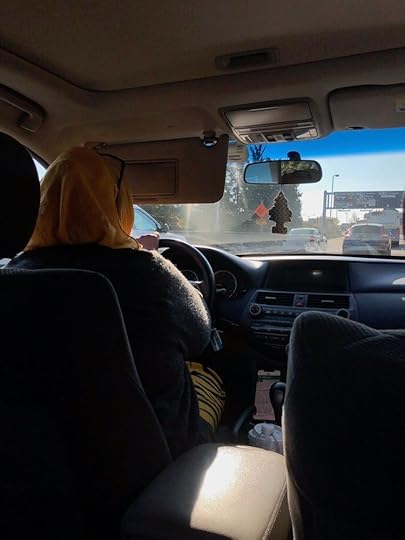
My driver, who like me had been silently hanging on her every word, said when Ms Hill finished: “Women should be running the world.”
Indeed.

November 9, 2019
Angst Management
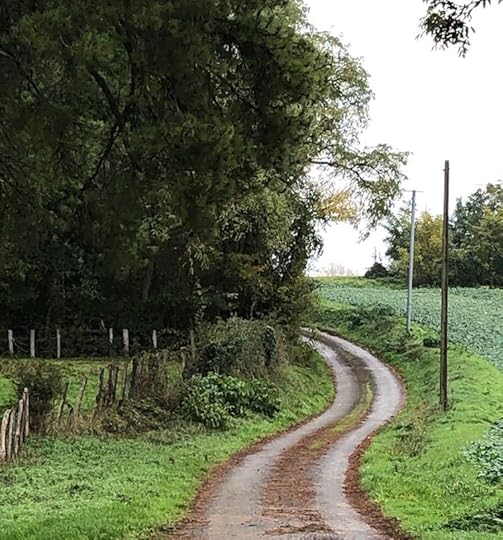
Friday, 8 November
Next Monday I leave on a US book tour for my novel The Art of Regret and it’s fair to say I’m a little anxious. I will be doing six cities—San Francisco, Boston, Wayne, PA, Philadelphia, Washington, DC and Chicago—in 12 days. The trip seems rife with potential pitfalls and if I'm not careful angst can get the better of me. The list begins like this:
I miss a plane and miss the reading (last night I dreamt just that).2. I make it to the reading but no one else bothers to show up.
3. I make it to the reading and there are lots of people and I stumble over my text. Or I am asked a question and my mind goes blank. My face reddens, my heart pounds, I am mortified. Perhaps I even break down in tears.
Fortunately two things over the last couple of weeks have kept these nightmarish scenarios somewhat at bay. First I’ve been too busy for my mind to linger on much of anything. In connection with the publication and thanks to the efforts of my excellent publicist Caitlin Hamilton Summie, I have been writing guest blogs and giving some interviews. With the help of Caitlin and my son William, I have been preparing for the readings themselves. For example:
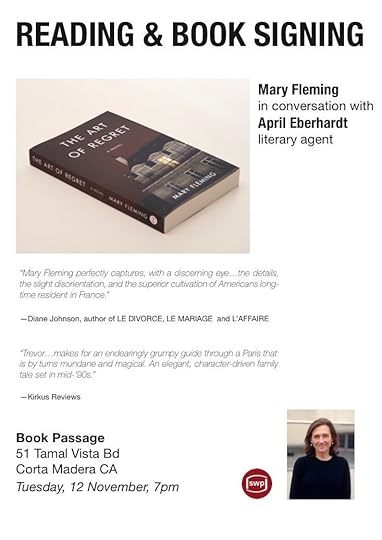
For the full list of events, click here to reach my website - please come if you live in one of these places!
These last two weeks I have spent almost all my time writing emails. I feel thrown back to the days when I worked for The German Marshall Fund, more like an administrator than a writer (we can add to the list of worries: 4. I’m losing my touch; my creative muscle has gone flaccid and I will never be able to write fiction again).
 Field of sugar beet
Field of sugar beetFortunately much of this administrating took place in the Perche, distraction number two. Though it rained almost every day during our stay, I was delighted with every drop. After the relentless sun last summer that left the earth so parched, the water felt like manna from heaven. It was too warm for late October-early November but one can't have everything. And whatever the weather, le Perche is stunningly beautiful.
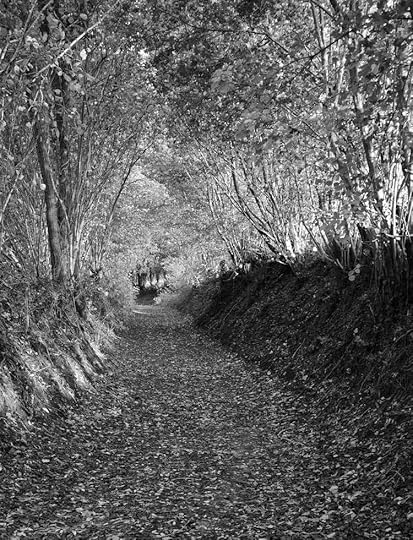
There was fruit to be picked. Apples, always apples...
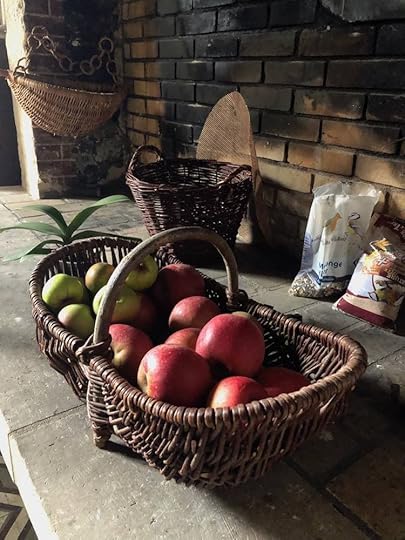
...and quince...
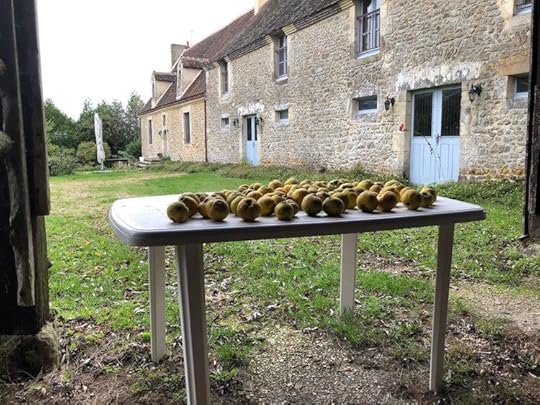
There was Tasha to walk and worry about, even more than usual. Now that the hunting season is in full swing her gilet jaune is de rigueur and I am wishing I had bought more than one of them.
 Tasha demonstrating her gilet jaune, day one
Tasha demonstrating her gilet jaune, day one Tasha demonstrating her gilet jaune, one week later
Tasha demonstrating her gilet jaune, one week laterThough the tattered and smattered state of her attire may indicate otherwise, Tasha has actually made progress on the roaming front. On our many jaunts she usually stayed within whistling distance and only once went off for more than half an hour.
 Evening, in front of the fire
Evening, in front of the fireOf the many email exchanges these last weeks, one has particularly stuck in my mind. When I mentioned some of the above anxieties about my trip to my friend Lara M she replied: “Don't be nervous. Don't dread it. Enjoy it! I would love to be embarking on a book tour!...We are both such fortunate people, whatever our frustrations in life.”
Lara is of course absolutely right - even if every one of my imagined ordeals over the next two weeks actually did occur.




